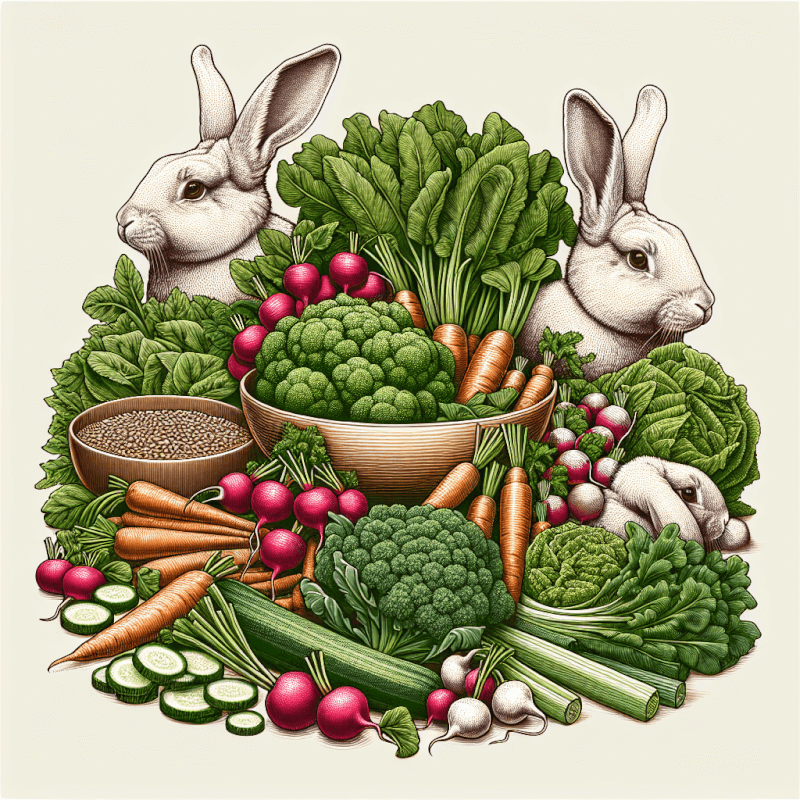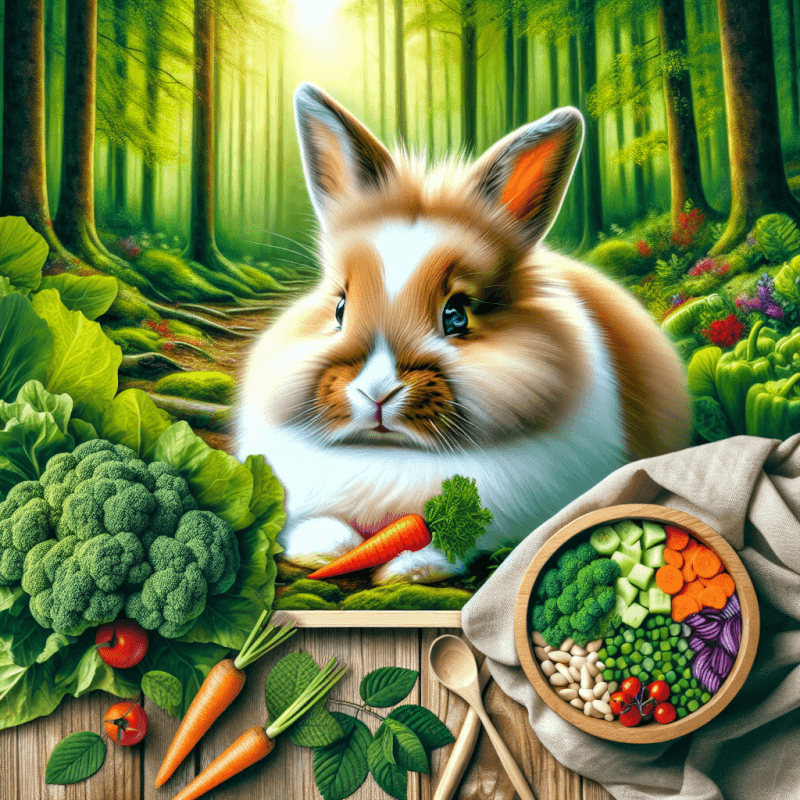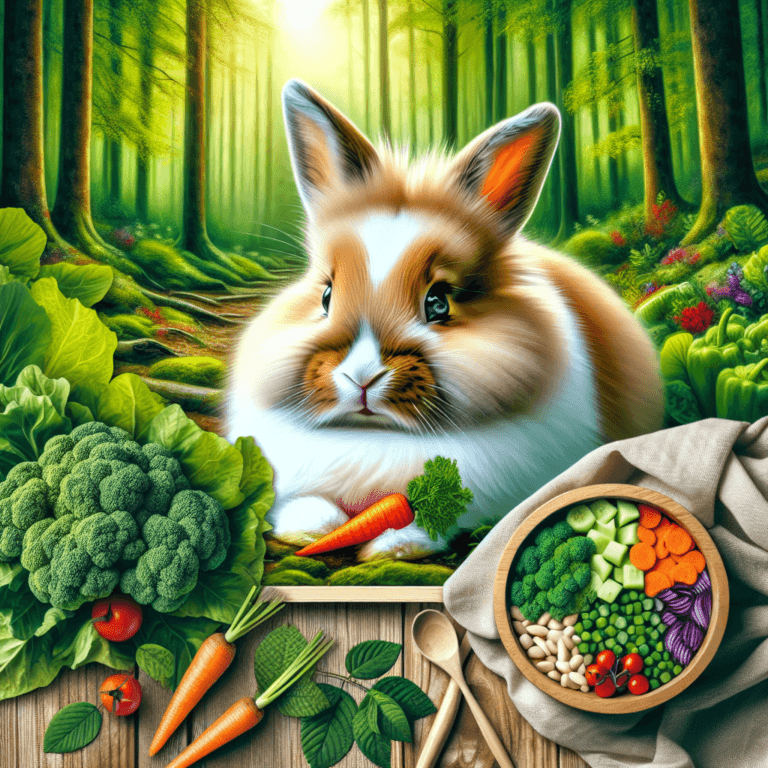If you’ve ever found yourself wondering about the dietary preferences of rabbits, you’re in for a treat! In this article, we’ll explore the fascinating world of rabbit cuisine, giving you an inside scoop on what these adorable creatures like to munch on. From fresh greens to crunchy vegetables, we’ll uncover the secret to keeping our fluffy friends nourished and happy. So, get ready to discover a whole new dimension of bunny food!
Overview of Rabbit Diet
Rabbits are herbivores, which means their diet consists mainly of plant-based foods. It is crucial to provide them with a balanced diet to ensure their health and well-being. A nutritious rabbit diet should comprise of hay, fresh vegetables, high-quality pellets, fresh herbs, and limited supplemental foods. Additionally, water plays a vital role in their diet, as rabbits need constant access to fresh, clean water. By understanding the specific dietary needs of rabbits, you can provide them with a well-rounded and fulfilling diet that promotes their overall health.
Ready for Cat Trivia?
Test your knowledge about cats!

Hay as the Main Component of Rabbit Diet
Hay is the foundation of a rabbit’s diet and should make up the majority of their food intake. There are different types of hay available for rabbits, such as timothy hay, orchard grass hay, and oat hay. These hays are rich in fiber, which is vital for a healthy rabbit digestive system. Fiber helps maintain proper gut motility and prevents gastrointestinal issues. Additionally, chewing on hay promotes dental health by wearing down their constantly growing teeth.
The amount of hay a rabbit requires depends on its size. As a general rule, a rabbit should have an amount of hay that is equivalent to its body size daily. This ensures that they have enough fiber to support their digestive system and maintain optimal health. It is important to provide fresh hay daily and remove any soiled or stale hay from their enclosure.

Fresh Vegetables for Rabbit Diet
In addition to hay, fresh vegetables are an essential part of a rabbit’s diet. They provide essential vitamins and minerals that support overall health and well-being. It is crucial to choose safe and nutritious vegetables for rabbits to prevent any digestive issues or toxicity. Some safe vegetables for rabbits include dark leafy greens like kale and spinach, bell peppers, carrots, broccoli, and celery.
When introducing vegetables to a rabbit’s diet, it is advisable to start with small amounts and gradually increase the quantity over time. This allows their digestive system to adjust to the increase in fiber content. Fresh vegetables should be offered daily, and any leftovers should be removed after a few hours to prevent spoilage.
Pellets as a Supplement
While hay and fresh vegetables should be the main components of a rabbit’s diet, high-quality pellets can be offered as a supplement. Pellets are formulated to provide necessary nutrients and vitamins that may be lacking in hay and vegetables. When choosing pellets, opt for ones that are specifically formulated for rabbits and made with high-quality ingredients.
The quantity of pellets a rabbit needs depends on its age and size. Growing rabbits require more pellets, while adult rabbits should have a limited amount to prevent obesity and other health issues. Always follow the recommended feeding guidelines on the pellet packaging and adjust the amount based on your rabbit’s individual needs. It is important to note that pellets should not be the primary food source for rabbits and should be given in moderation.

Water Requirements for Rabbits
Water is of utmost importance in a rabbit’s diet. Fresh, clean water should be readily available for rabbits at all times. Providing constant access to water ensures proper hydration, which is crucial for their overall health and well-being. Water helps maintain body temperature, aids in digestion, and keeps the body functioning optimally.
Rabbits can drink from a water bottle or a water bowl, depending on their preference. It is essential to clean and refill their water source daily to prevent the buildup of bacteria or contaminants. If you notice that your rabbit is drinking significantly more or less water than usual, it might be a sign of an underlying health issue, and a veterinarian should be consulted.
Healthy Treats for Rabbits
Treats can be a fun way to bond with your rabbit and provide them with additional enjoyment. However, it is essential to choose treats that are safe and nutritious for rabbits. Some safe treat options for rabbits include small pieces of fruits like apples, strawberries, and bananas, as well as herbs like parsley and cilantro. Treats should be given in moderation to prevent weight gain and maintain a balanced diet.
When giving treats to rabbits, it is crucial to avoid sugary or fatty treats, as they can lead to weight gain or digestive issues. Always introduce new treats gradually to assess any potential reactions or sensitivities. Remember that treats should never replace the main components of a rabbit’s diet and should only be given as occasional rewards or enrichment.

Avoiding Harmful Foods
As much as it is important to know what rabbits can eat, it is equally important to be aware of foods that are harmful to them. Some foods can be toxic to rabbits and should be strictly avoided. These include chocolate, caffeine, onions, garlic, avocados, and certain houseplants like lilies. Feeding these foods to rabbits can lead to serious health issues or even be fatal.
In addition to toxic foods, rabbits can also experience gastrointestinal issues if their diet is not properly balanced. Feeding them high-fat foods, foods high in sugar, or sudden changes in their diet can disrupt their delicate digestive system and lead to issues like diarrhea or stomach pain. It is important to maintain a consistent and balanced diet for rabbits to avoid any digestive concerns.
Introduction of Fresh Herbs
Fresh herbs are not only a flavorful addition to a rabbit’s diet but also offer numerous health benefits. Herbs like parsley, cilantro, and basil can provide additional nutrients, aid digestion, and promote overall well-being. Fresh herbs should be introduced gradually, starting with smaller quantities to ensure that your rabbit tolerates them well.
Herbs can be offered as a part of their daily vegetable intake, mixed in with hay or pellets, or used as a garnish on their meals. It is important to wash herbs thoroughly before feeding them to remove any pesticides or contaminants. Fresh herbs not only add variety to a rabbit’s diet but also contribute to their overall health and happiness.

Supplemental Foods and Fruits
While hay, vegetables, and pellets should form the bulk of a rabbit’s diet, supplemental foods and fruits can be offered in limited quantities. Supplemental foods like oats, barley, or bran can provide additional fiber and variety to their diet. However, these foods should be given sparingly to prevent any digestive issues or imbalances.
When it comes to fruits, it is important to choose healthier options that are lower in sugar. Apples, strawberries, and blueberries are safe choices and can be given as occasional treats. Fruits should be offered in small quantities to prevent weight gain and should not replace the main components of the rabbit’s diet.
Considerations for Feeding Baby and Senior Rabbits
Feeding baby and senior rabbits requires special attention to their specific nutritional needs. Young rabbits have different dietary requirements than adults, as they are growing rapidly. It is essential to provide them with a diet rich in fiber, protein, and essential vitamins to support their growth and development. Consult a veterinarian or a rabbit expert for appropriate feeding guidelines for young rabbits.
Senior rabbits, on the other hand, may have specific dietary considerations due to age-related health issues. It is crucial to monitor their weight, adjust their diet accordingly, and provide foods that are easier to digest. Senior rabbits may require softer or mashed foods, increased fiber content, and regular vet check-ups to ensure their nutritional needs are being met.
In conclusion, providing a well-balanced diet is essential for a rabbit’s overall health and well-being. By including hay as the main component, introducing fresh vegetables, offering high-quality pellets as a supplement, providing access to fresh water, and incorporating healthy treats, you can ensure that your rabbit’s nutritional needs are met. It is equally important to avoid harmful foods, introduce fresh herbs, offer limited supplemental foods and fruits, and consider the specific dietary needs of baby and senior rabbits. By following these guidelines and being attentive to your rabbit’s dietary needs, you can promote their health and happiness for years to come.



